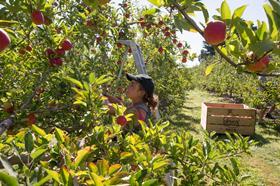
The New Zealand Government has announced a range of immigration policy changes aimed at filling labour shortages in horticulture and viticulture, while also supporting the country’s residents who are out of work due to Covid-19
The Supplementary Seasonal Employment (SSE) visa will be automatically given to around 11,000 working holiday visa holders in New Zealand with visas expiring between 1 November 2020 and 31 March 2021.
These visas will allow them to work in horticulture and viticulture roles, where there are not enough New Zealanders available to do this work.
New Zealand minister of immigration, Kris Faafoi, said the move to grant automatic visa extensions was made to support the country’s horticulture and wine sectors.
“These sectors are among a range of industries performing critical roles in supporting New Zealand’s Covid-19 economic recovery and generating vital export earnings,” explained Faafoi.
“It’s important we support them to keep going, while ensuring that, where there are job opportunities, New Zealanders are given a fair chance at filling them.
“This season we expect more Kiwis, who have lost jobs due to Covid-19, will be available to work in these sectors, but it is likely there will be a shortfall of workers as these industries have often relied on migrants for their seasonal peaks,” he added.
Employers can take on these workers when there are unfilled Recognised Seasonal Employer (RSE) scheme spaces with an RSE employer, or there are unfilled roles available with an accredited SSE employer
Employers will also be able to take on SSE workers for roles in regions specified on a list which the Ministry of Social Development is currently compiling.
Government changes will also enable other work visa holders to apply for an SSE visa if they have a job offer from one of these employers or if the job is on the Ministry of Social Development list.
In addition, all RSE scheme workers stranded in New Zealand who have been granted a more flexible limited visa to be able to work part-time and do non-RSE work will be able to ‘re-enter’ the RSE scheme and work for an RSE employer with 30 hours per week average pay guaranteed.
Faafoi said the changes would help fill roles that cannot be filled by New Zealanders in the short term, while the industry works on other solutions.
“While unemployment is increasing due to the disruption caused by the pandemic, a lot of this is occurring in urban centres away from seasonal work. Without these visa changes, there will not be enough people in the right locations to ensure fruit and produce is picked in time to ensure that flow-on economic recovery benefits protect other New Zealand jobs,” explained Faafoi.
The changes are for the 2020/21 season only.



